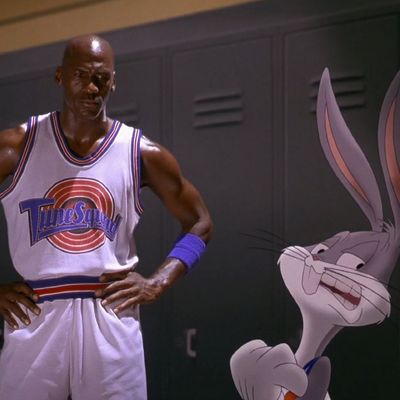
The Last Dance is not an especially comedic watch, but God bless whoever edited Sunday night’s installment, as they gave us what seems likely to end up as the most hilarious moment of the entire project. Smack dab in the middle of two hours devoted to Michael Jordan’s insatiable drive to obliterate his opponents, episode eight must also note that he spent the summer after his ignominious 1995 playoff exit filming a children’s movie alongside Bugs Bunny. Smash cut to Jordan on the set of Space Jam, surrounded by actors in morph suits wiggling all around him like neon-green sperm. Of the approximately 36,000 seconds that make up The Last Dance, these are undoubtedly the five silliest.
The docuseries otherwise swerves around the comedic potential of an athlete of Jordan’s caliber forced to endure the indignities of a modern studio blockbuster, preferring instead to tell a story about how the pickup games Jordan played during the gaps in his shooting schedule got his body and mind back into championship shape. But Sunday’s episodes hit so hard at the idea of Jordan as the ultimate competitor that it makes the fact of Space Jam’s existence feel even more ridiculous — the kind of thing you can imagine Jordan making fun of another player for doing. “I’m like, This guy’s supposed to be all about winning. Now he’s doing a movie with the Looney Tunes? Come on.”
So, why did Michael Jordan make Space Jam? It was essentially a business decision.
By all accounts, the idea for Space Jam came from M.J.’s agent, David Falk. Jordan had previously played alongside Bugs Bunny in a 1992 Super Bowl commercial for Nike, and Falk hit upon the idea of expanding that minute-long spot into a feature film. The eureka moment was less about the duo’s palpable screen chemistry (though that was apparently what convinced Warner Brothers to greenlight the project) and more in terms of brand synergy. Warners at the time was looking to reboot the Looney Tunes, and according to the Chicago Tribune, Falk sold the concept to the studio “as much for its merchandising potential as for its box-office appeal.” Jordan and his team had spent years turning down Hollywood offers; taking the wrong project could lead to disaster. (See: Kazaam.) But this one ticked all the right boxes: Starring in a kid’s movie fit perfectly with Jordan’s squeaky-clean image, and it gave him a role everyone knew he could handle: himself. The project also provided numerous cross-promotional opportunities, including plenty of screen time for the Air Jordans and key product placement for his other endorsements. “Everything he did was integrated,” Falk would say later.
There were other brand-building elements at play too. Falk pitched Jordan to Warners as a figure whose appeal “transcends the world of sports,” and Space Jam would only increase his Q rating. Millions of children who weren’t staying up for the Eastern Conference Semifinals would still go out and see the film in theaters, where it made $230 million worldwide, becoming, in the process, an integral part of the millennial canon. Then there were the ancillary revenue streams: The merchandise sales alone brought in an additional $1.2 billion. Jordan’s fee for starring in the film has never been disclosed, but assuming he got a cut of the merch — a likely assumption, considering the idea originated with his agent — it probably wound up being an incredibly lucrative summer for him. This was probably enough to make up for what was reportedly a “grueling” six weeks for Jordan. “It’s hard to say he had fun,” Falk told the Tribune.
And the movie would pay off in other ways. As The Last Dance explains, the 1995 Bulls lost in part because they had no one who could fill the hole left by the departure of Horace Grant. For years, Space Jam director Joe Pytka has taken credit for helping them find Grant’s replacement. “I said, ‘Why haven’t you guys gone after Dennis Rodman? […] The guy doesn’t shoot, he plays defense, he rebounds, and he doesn’t get in your way,’” Pytka recalled to Entertainment Weekly in 2016. “That night, Dennis Rodman was at this Beverly Hills hotel with Michael, and they made the deal that Monday.” This was arguably one of the best director’s notes ever: Even the best filmmakers usually only get their stars one trophy; this one earned three.


